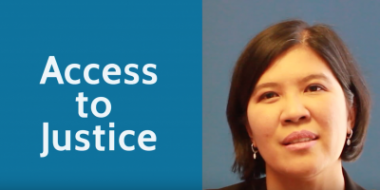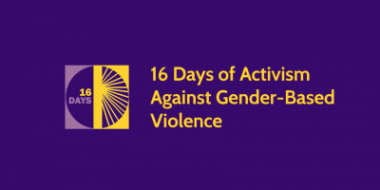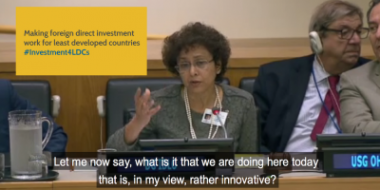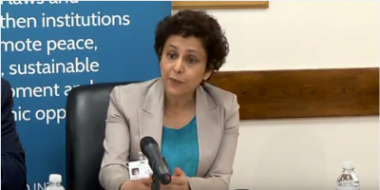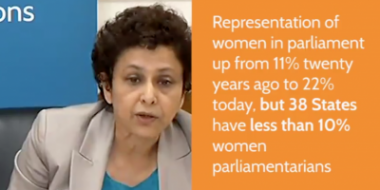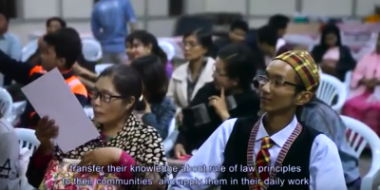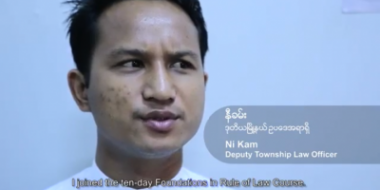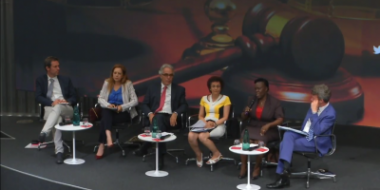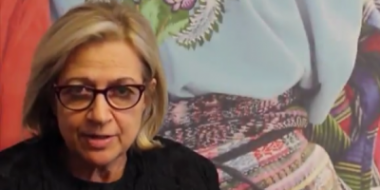Statement by the Director-General, Jan Beagle at the Special Event on Equal Access to Justice for All - 14th UN Congress on Crime Prevention and Criminal Justice
9 March, 2021
Kyoto, Japan
Excellencies,
Distinguished Delegates,
Colleagues and Friends,
It is a pleasure to join this eminent panel on the critical issue of Equal Access to Justice for All, which is at the heart of the work of the International Development Law Organization.
IDLO works in every region of the world, including in some of the most fragile contexts, where justice and the rule of law are most at risk, and where rights are under threat, serving the most vulnerable among justice seekers.
Access to justice and the rule of law lie at the heart of inclusive and sustainable development. They are also critical to building and sustaining peace.
Many root causes and drivers of conflict and instability, such as impunity, corruption, human rights violations, and lack of accountability, are linked to an absence of justice systems and the rule of law.
This was recognized in the 2030 Agenda for Sustainable Development, most prominently in Goal 16.
But justice only becomes a lived reality when people can access it, and for too many people around the world it remains unattainable.
Even before COVID-19, over 1.5 billion people had a justice problem that they could not resolve:
- because they did not have means to reach a court or afford legal assistance;
- because they were unaware of their rights or how to exercise them;
- because legal procedures were too complicated, and cases dragged on for years; or
- because they were excluded or discriminated against in law or practice.
Like other aspects of public life, justice systems have been hard hit by the pandemic. Restrictions on physical access to courts and tribunals and the slowing down of operations have coincided with a sharp rise in the need for legal protection and services.
Over the past year, as part of our contribution to a rule of law-based response to COVID-19, IDLO has worked with governments and civil society to address emerging justice needs.
Necessity is often the mother of invention. While COVID-19 laid bare the consequences of years of underinvestment in justice systems, it also challenged us to innovate and explore alternative approaches.
In Kenya for example, IDLO supported the judiciary to keep courts operational during lockdowns by developing electronic case filing and management systems.
In the Sahel, we launched a programme to strengthen criminal justice chains - making them more efficient, accountable and respectful of human rights – through the use of community engagement platforms.
Drawing on our experience, I would like to share three ways in which we can work together to accelerate progress towards ensuring access to justice for all by 2030.
First, closing the justice gap and promoting a just, sustainable and equitable recovery from COVID-19 will require reimagining justice systems, with people at their centre.
We must recognize that people resolve their disputes and access justice through diverse pathways, and prioritize reforms and innovations to increase access and inclusion and produce fairer outcomes for justice seekers.
This includes equitable digital innovation, expanding legal aid, leveraging Alternative Dispute Resolution and customary and informal systems, and adopting more restorative approaches to corrections.
Secondly, ensuring access to justice for those most at risk of being left behind, particularly women and girls, must be a priority.
Gender equality is first and foremost a fundamental human right, but the full and equal participation of women and girls in all aspects of public and private life is key to the implementation of the 2030 Agenda.
Along with UNODC and other partners, IDLO released a report last year on “Justice for Women Amid Covid-19,” highlighting how the pandemic is further increasing the staggeringly wide gap of injustice and inequality that women face across the globe.
The dramatic rise in intimate partner violence during times of lockdown is a clear example. Over the course of 2020, IDLO has adapted its work on combatting gender-based violence to address the increased demand for support, and services for survivors.
In Afghanistan, for example, we have been supporting women’s shelters which saw numbers of survivors seeking refuge double in some cities.
My third and final point is that we must act urgently to reverse the alarming decrease in political and financial support for justice and the rule of law.
Surveys such as those conducted by the World Justice Project have shown consistent negative trends – rising authoritarianism, lack of trust in public institutions, closure of civic space, and increased human rights violations. And all of these have been exacerbated by the pandemic.
Spending on the legal and justice sector as a share of ODA and national budgets has also declined, and is likely to be further affected by the economic crisis generated by COVID-19.
These trends have grave implications, not just for the goal of ensuring access to justice for all, but for the achievement of the entire 2030 Agenda.
But another lesson of the pandemic is that we are all in this together. The crisis has shown what can be achieved through cooperation and solidarity. Partnerships will be key to driving change.
IDLO is privileged to work with partners like UNODC to advance our shared commitment to ensuring access to justice for sustaining peace and development.
As part of our efforts to facilitate new partnerships and share information on challenges, innovations and good practices, IDLO is co-organizing, with Italy and UNDESA, a global multi-stakeholder conference on SDG 16 next month.
It will be an opportunity to take stock of the current state of play on how goals related to peace, justice and inclusion have been affected by COVID-19, and to explore ways to accelerate progress on SDG 16.
I welcome all of you to join us from 28 to 30 April.
Investing in a culture of justice is the surest way to manage the current crisis, build resilience to future shocks and work towards a more peaceful, just and inclusive future.
My colleagues and I look forward working with you all, and other champions, to help make justice for all a reality.
Thank you.


